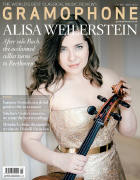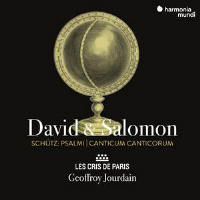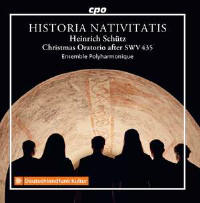Texte paru dans: / Appeared in:
|
|||||||
|
Outil de traduction |
|||||||
|
Geoffroy Jourdain and Les Cris de Paris apply their communicative extroversion to Schütz’s settings of texts from the Psalms of David and the Song of Solomon. Almost all of the intelligently devised programme is taken from the publications Psalmen Davids (Dresden, 1619), Cantiones sacrae (Freiberg, 1625) and the first book of Symphoniae sacrae (Venice, 1629). Many of the 23-strong choir perform solos boldly, and instrumentalists are selected from a rich squad of 23 players. The vivaciously spirited performances pack a visceral punch. The gutsy opener ‘Alleluja! Lobet den Herren’ has manifold splendour and is followed by the penitential sobriety of ‘Die mit Tränen säen’. Ich beschwöre euch, ihr Töchter zu Jerusalem, preserved in a manuscript copied in 1641, is a dialogue in which four sopranos utter the Shulamite bride’s words brightly and the darker-hued timbres of two tenors and a bass respond as the Daughter of Jerusalem, before all seven voices combine rapturously for the final stanza. Anima mea liquefacta est’ is performed by solo tenor and baritone with two cornetts (and serpent) and continuo (particularly harp) with firm expressivity. The sorrowful ‘An den Wassern zu Babel’ might have benefited from a touch more security with tuning and less vibrato from the choir, and somewhat more shading may have achieved more effective catharsis during the tempestuous fervour of ‘Warum tobendie Heiden’. ‘Ego dormio et cor meum vigilat’ conveys passionate dynamism, although four solo voices do not always have reliable intonation. On the other hand, ‘Vulnerasti cor meum’ is performed exquisitely by soprano and tenor, its alto and bass voice parts played by violas da gamba. The firecracker finale ‘Danket dem Herren, denn er ist freundlich’ includes trumpet and timpani as well as cornetts, sackbuts, strings and large continuo group. ΞΞΞΞΞΞΞ Ensemble Polyharmonique present another way of placing Schütz in an imaginative new context. When the Christmas Story was first published in 1664 only the Evangelist’s recitatives were printed; a memorandum explained that the author believed the missing choral introduction, eight concerted intermedia and conclusion would ‘scarcely achieve their proper effect’ if attempted ‘outside of princely well-appointed chapels’. The full material requiring 11 singers and a panoply of instruments could be obtained for a small fee from agents in Dresden and Lepizig but less lavishly funded churches that had fewer voices and simpler instrumental resources could use the printed recitatives to construct their own musical presentation of the Christmas narrative. This approach is taken by Alexander Schneider for an imaginary ‘Historia Nativitatis’ that fills the gaps with music by an almanac of church composers in 17th-century Germany, such as Eccard’s lovely five-voice paraphrase of the Magnificat, Calvisius’s gentle six-voice lullaby Joseph, lieber Joseph mein, Hammerschmidt’s blithe angel visiting the shepherds, Praetorius’s perennial Es ist ein Ros entsprungen (its middle verses sung as solos with gentle continuo accompaniment) and a softly lively account of Scheidt’s In dulci jubilo (and much else). A few other pieces by Schütz include the dulcet ‘Sei gegrüsset, Maria, du Holdselige’ (a duet from Kleine geistliche konzerte II, 1639), and the authoritative ‘Das Wort ward Fleisch’ (Geistliche Chor-Music, 1648). Using high pitch (A=465) and meantone temperament, the refined music-making of Ensemble Polyharmonique’s six singers, two violins and continuo group (theorbo, harp, dulcian, gamba, violone and organ) is gorgeously balanced and eloquently graceful. |
|||||||





